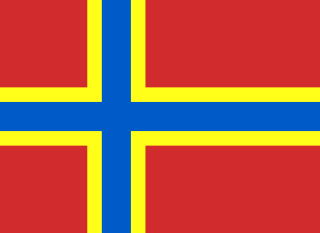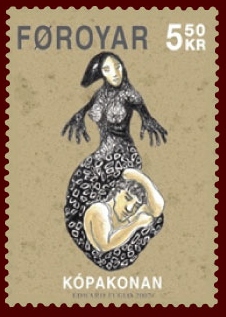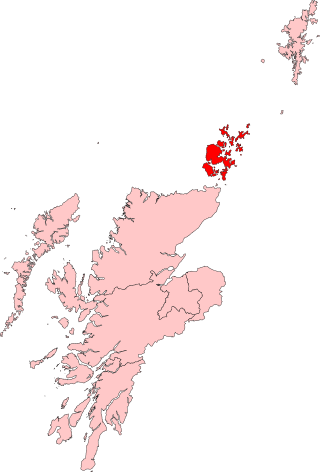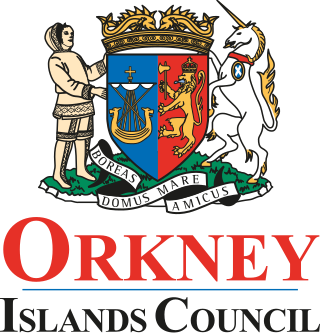Norse is a demonym for Norsemen, a Medieval North Germanic ethnolinguistic group ancestral to modern Scandinavians, defined as speakers of Old Norse from about the 9th to the 13th centuries.
Norn is an extinct North Germanic language that was spoken in the Northern Isles off the north coast of mainland Scotland and in Caithness in the far north of the Scottish mainland. After Orkney and Shetland were pledged to Scotland by Norway in 1468–69, it was gradually replaced by Scots. Norn is thought to have become extinct in 1850, after the death of Walter Sutherland, the language's last known speaker, though there are claims the language persisted as late as the 20th century.

Orkney, also known as the Orkney Islands or The Orkneys, is an archipelago in the Northern Isles of Scotland, situated off the north coast of the island of Great Britain. Orkney is 10 miles (16 km) north of the coast of Caithness and has about 70 islands, of which 20 are inhabited. The largest island, the Mainland, has an area of 523 square kilometres (202 sq mi), making it the sixth-largest Scottish island and the tenth-largest island in the British Isles. Orkney's largest settlement, and also its administrative centre, is Kirkwall.

Kirkwall is the largest town in Orkney, an archipelago to the north of mainland Scotland.

Earl of Orkney, historically Jarl of Orkney, is a title of nobility encompassing the archipelagoes of Orkney and Shetland, which comprise the Northern Isles of Scotland. Originally founded by Norse invaders, the status of the rulers of the Northern Isles as Norwegian vassals was formalised in 1195. Although the Old Norse term jarl is etymologically related to "earl", and the jarls were succeeded by earls in the late 15th century, a Norwegian jarl is not the same thing. In the Norse context the distinction between jarls and kings did not become significant until the late 11th century and the early jarls would therefore have had considerable independence of action until that time. The position of Jarl of Orkney was eventually the most senior rank in medieval Norway except for the king himself.

The Mainland, also known as Hrossey and Pomona, is the main island of Orkney, Scotland. Both of Orkney's burghs, Kirkwall and Stromness, lie on the island, which is also the heart of Orkney's ferry and air connections.

The Northern Isles are a pair of archipelagos off the north coast of mainland Scotland, comprising Orkney and Shetland. They are part of Scotland, as are the Hebrides. The climate is cool and temperate and much influenced by the surrounding seas. There are a total of 36 inhabited islands. The landscapes of the fertile agricultural islands of Orkney contrast with the more rugged Shetland islands to the north, where the economy is more dependent on fishing and on the oil wealth of the surrounding seas. Both island groups have a developing renewable energy industry. Both have a Pictish and Norse history. Both were part of the Kingdom of Norway until they were absorbed into the Kingdom of Scotland in the 15th century. They remained part of it until the 1707 formation of the Kingdom of Great Britain and the 1801 formation of the United Kingdom. They both played a significant naval role during the world wars of the 20th century.

The South Orkney Islands are a group of islands in the Southern Ocean, about 604 km (375 mi) north-east of the tip of the Antarctic Peninsula and 844 km (524 mi) south-west of South Georgia Island. They have a total area of about 620 km2 (240 sq mi). The islands are claimed both by Britain, and by Argentina as part of Argentine Antarctica. Under the 1959 Antarctic Treaty, sovereignty claims are held in abeyance.

Selkies are mythological creatures that can shapeshift between seal and human forms by removing or putting on their seal skin. They feature prominently in the oral traditions and mythology of various cultures, especially those of Celtic and Norse origin. The term “selkie” derives from the Scots word for “seal”, and is also spelled as silkies, sylkies, or selchies. Selkies are sometimes referred to as selkie folk, meaning 'seal folk'. Selkies are mainly associated with the Northern Isles of Scotland, where they are said to live as seals in the sea but shed their skin to become human on land.

Unstan ware is the name used by archaeologists for a type of finely made and decorated Neolithic pottery from the 4th and 3rd millennia BC. Typical are elegant and distinctive shallow bowls with a band of grooved patterning below the rim, a type of decoration which was created using a technique known as "stab-and-drag". A second version consists of undecorated, round-bottomed bowls. Some of the bowls had bits of volcanic rock included in the clay to make them stronger. Bone tools were used to burnish the surfaces to make them shiny and impermeable.

Orkney and Shetland is a constituency of the House of Commons of the Parliament of the United Kingdom. It elects one Member of Parliament (MP) by the first past the post system of election. In the Scottish Parliament, Orkney and Shetland are separate constituencies. The constituency was historically known as Orkney and Zetland.

Orkney is a constituency of the Scottish Parliament (Holyrood) covering the council area of Orkney. It elects one Member of the Scottish Parliament (MSP) by the first past the post method of election. It is also one of eight constituencies in the Highlands and Islands electoral region, which elects seven additional members, in addition to the eight constituency MSPs, to produce a form of proportional representation for the region as a whole.
The Orkney Heritage Society in Orkney, Scotland, is a nonprofit organisation founded in 1968.

The Orkney football team is the representative football team for the islands of Orkney, Scotland. They are not affiliated with FIFA or UEFA. The team regularly competes in the Island Games and has a strong rivalry with the representative teams of Shetland and Caithness.
A nuggle, njuggle, or neugle, is a mythical water horse of primarily Shetland folklore where it is also referred to as a shoepultie or shoopiltee on some parts of the islands. A nocturnal creature that is always of a male gender, there are occasional fleeting mentions of him connected with the Orkney islands but he is more frequently associated with the rivers, streams and lochs of Shetland. He is easily recognised by his distinctive wheel-like tail and, unlike his evil counterparts the each-uisge or the nuckelavee, has a fairly gentle disposition being more prone to playing pranks and making mischief rather than having malicious intents.

The Orkney Islands Council, is the local authority for Orkney, Scotland. It was established in 1975 by the Local Government (Scotland) Act 1973 and was largely unaffected by the Scottish local government changes of the mid-1990s.













